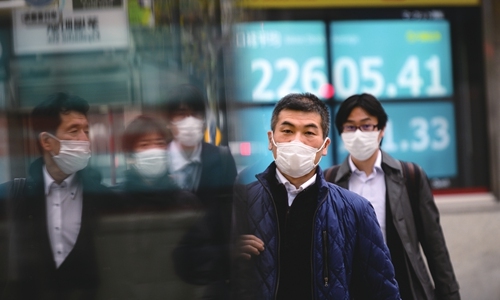Japan grapples with COVID-19 crisis ahead of upcoming holidays
Source:Global Times Published: 2020/4/24 12:58:52

Pedestrians wear face masks amid concerns over the spread of the COVID-19 novel coronavirus, in Tokyo. Photo: AFP
When COVID-19 patients on board the Diamond Princess cruise ship disembarked at the port of Yokohama in late February, the Japanese government was criticized for its handling of the outbreak. But given data on the spread of the coronavirus, Japan seemed to have done a good job in containing the virus at that time. However, numbers of infections and COVID-19 related deaths in Japan have surpassed those of South Korea, reflecting flaws in Japan's epidemic prevention.
In the early stages of the outbreak, Japan appeared optimistic about the situation, thinking it wouldn't escalate to severe. The Japanese government had been worrying about the 2020 Olympic Games, which have now been postponed to 2021. Tokyo didn't wish to increase stress in society, which can be seen in its attempts to kick off the games as planned.
Another concern for Japan is its economy, which declined in the fourth quarter of 2019. If the economy declines again in the first quarter of 2020 and such a trend continues, Japan will face a recession. Japanese society will then be panicked and worry that their medical system cannot withstand the pressure of the pandemic. The number of critical care beds per 100,000 people in Japan is 7.3, compared with Germany's 29.2 and the US' 34.7, putting Japanese people at a higher risk if they are severely infected.
Although the Abe administration issued epidemic prevention regulations after passengers of the Diamond Princess disembarked, the provisions were not strict and testing was limited.
As the Olympic Games have already been postponed and there is hope the economy will be revitalized, the Japanese government has launched stricter measures to curb the virus, but it has missed the best timing.
The Abe administration declared on April 7 an emergency in Tokyo and its surrounding regions. On April 16, Japanese Prime Minister Shinzo Abe announced a nationwide state of emergency, with 13 prefectures designated as "special alert prefectures."
The government also finalized a record 108 trillion yen ($990 billion) stimulus package to help struggling households and businesses overcome the tough times. It is the largest package since the end of WWII, aiming to help the implementation of virus prevention measures.
In spite of the stricter regulations, there are still hidden perils, one of which is whether the regulations will be strictly carried out. Although the huge crowds have disappeared in downtown areas like Ginza and Shibuya in Tokyo, people still flood into parks and supermarkets, where they neglect social distancing advice.
The good news is that Japanese people have become more aware of the severity of COVID-19 and the danger of its spread. But weak prevention efforts in the early stages of the outbreak have resulted in a high number of asymptomatic or mild symptom infections in Japan. This will complicate virus prevention.
Japanese police have reported that 11 people found dead in their homes or on streets in the four weeks leading up to mid-April posthumously tested positive for COVID-19. Such deaths increase the risk of infection among police officers. If police suffer widespread infection, public security would be affected and the impact Japanese society would face is unthinkable.
For Japan, a most urgent task right now is to conduct more testing and effectively allocate healthcare resources. Medical professionals working on the frontline must be protected both physically and psychologically, as discriminations against them and their families are surging in Japan, which is not conducive to virus prevention.
The Japanese government should brace for its upcoming challenge - the Golden Week holidays from May 2-6. The government has called on people to stay at home and avoid long-distance travels to reduce the spread of the virus. But the extent to which people, especially young people, will obey the request has yet to be seen. The holidays will define the next stage of Japan's fight against the coronavirus.
Although the overall level of education in Japan is relatively high and Japanese people are generally prone to conforming to their government's requests, given the worrying increase in COVID-19 numbers, they should not treat the pandemic lightly.
This article was compiled by Global Times reporter Xu Hailin based on an interview with Da Zhigang, director and research fellow of the Institute of Northeast Asian Studies at the Heilongjiang Provincial Academy of Social Sciences. opinion@globaltimes.com.cn
Posted in: ASIAN REVIEW